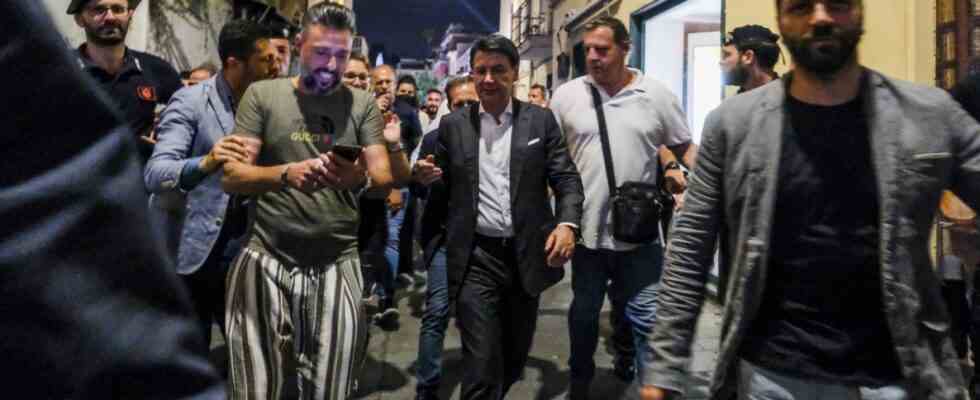The situation is serious, but is it serious? The old quip from Italian politics was once again justified when the Senate of the Republic prepared to receive Mario Draghi on Tuesday. Until recently, it was not clear whether his broad governing majority – which includes almost all parties from the right-wing Lega to the Cinque Stelle to the post-communists – could agree on Italy’s arms deliveries to the Ukrainians. At least that’s how it should look: Just hours before the appointment there was a crisis summit, the media sent breaking news. The daily newspaper La Republica for example, the following line was pushed to their readers’ cell phones: “Guns for Kyiv: short circuit in the government.” As if Draghi was about to fall.
Italy’s prime minister was summoned to present the country’s position ahead of his international meetings in Brussels and Elmau, the Council of Europe and the G7. While this is clear to everyone, it is also contained in a legal decree that was approved by the entire coalition of national unity. It states, among other things, that Italy can deliver arms to Ukraine until December 31 if Kyiv asks for them.
Lega and Forza Italia also voted in favour, although their two leaders, Matteo Salvini and Silvio Berlusconi, have long been very close to Russian President Vladimir Putin: Salvini as a fan, Berlusconi as a friend. You are Putiniani, as they say to those who understand Putin in Italy, although of course they would no longer say so openly.
The Five Stars also voted for Draghi’s decree, and that was doubly important: since their election victory in 2018, they have by far the largest groups in the parliamentary chambers; in their ranks and among their voters there are many opponents of armaments and so-called pacifists. Draghi convinced her by saying that the Ukrainians should be able to decide for themselves what kind of peace they want, and that they now need to be able to defend themselves against the aggressors.
But the inner turmoil remained, it runs right through the party, which has shrunk drastically, including its top hierarchy level. And because the Italians will elect a new parliament next year, the leadership is not just concerned with its position on the war in Ukraine, which should be debated, but also with the first messages to the electorate.
Giuseppe Conte against Luigi Di Maio – in the end only one remains
Two camps have bickered by the stars, apparently irreconcilably. One thing stands behind Giuseppe Conte, the former prime minister of Italy, who has been the party’s “capo politico” since last summer. He speaks for the orthodox wing of the Cinque Stelle, the original wing. That’s somewhat odd, given that the southern Italian lawyer, who is more of a Christian Democrat by nature, has only been a registered member of comedian Beppe Grillo’s movement since last summer. Despite his personal popularity with the people, Conte has so far not managed to stop the party’s decline: in the polls, the Cinque Stelle is still around 13 percent, 20 percentage points below the election result four years ago. They collapsed completely in the recent municipal elections. Conte badly needs a turnaround, however.
It was precisely in this phase that his predecessor and former sponsor Luigi Di Maio opposed him. Italy’s foreign minister, a “Grillino” from the very beginning and now “Draghiano”, has quite bluntly accused Conte of driving the party into the ground. He also said Conte was confusing voters with his half-hearted support of Europe’s transatlantic line on the war in Ukraine. After the attack, the party came close to throwing Di Maio out, but then settled on a warning. The young Di Maio finally resigned himself on Tuesday evening, he wants to found a new party called “Insieme per il futuro” (Together for the future), which would then join a new camp in the center.
“Today I and many other colleagues are leaving the Five Star Movement. We are leaving what will no longer be the first force in Parliament tomorrow,” said 35-year-old Di Maio late Tuesday evening in Rome.
Personal animosity also resonates in the showdown between Conte and Di Maio, and that’s rarely a wholesome mix in politics. In Italy it is said that in the end only one of the two will be left. Conte doesn’t do so well with Draghi either. But the incumbent prime minister has always remained calm when his predecessor tried to slow him down. The dissatisfied Cinque Stelle doesn’t seem to want early elections either – not now, not in this state.
In the run-up to Draghi’s appearance in parliament, Conte had first demanded that Italy stop delivering arms to Ukraine, then that at least a vote would be taken on renewed arms deliveries. He soon gave up both demands because no one followed him. What remains is a resolution calling on the government to involve Parliament more in this matter in the future. Everyone can live with that. And Italy stays on course.

